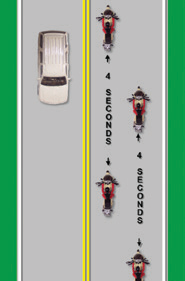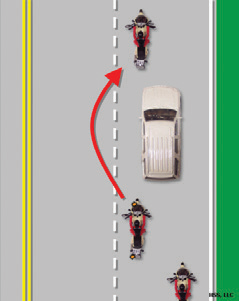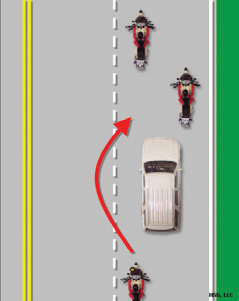
Section 8: Passengers, Cargo, and Group Riding
Section 8: Passengers, Cargo and Group Riding
This Section Covers
- Carrying Passengers and Cargo – 8.1
- Group Riding – 8.2
Only skilled, experienced riders should carry passengers or heavy loads or ride in groups. If you choose to carry passengers or heavy loads or ride in a group you will need to know some important information.
8.1 – Carrying Passengers and Cargo
Before carrying a passenger or heavy loads, know how both could affect motorcycle operation. The extra weight of a passenger or cargo will affect the way your motorcycle handles, requiring extra practice, preparation and caution. For this reason, only experienced riders should attempt to carry passengers or large loads. Before taking a passenger or heavy load on the street, check the air pressure of both tires and adjust the suspension settings to compensate for the lower rear of the motorcycle. Refer to the owner’s manual for more information.
When carrying a passenger, your motorcycle should have:
- A seat large enough to hold both of you. The passenger should be seated behind you and should sit as far forward as possible. No passenger regardless of age should be seated in front of you.
- Footrests for the passenger to prevent them from falling off and pulling you off, too.
- Secure hand strap or solid handholds for the passenger to hold onto. The passenger can also hold on to your waist, hips, or belt.
When riding with passengers:
- Ride a little slower, especially when taking curves, corners, or bumps.
- Start slowing earlier; you may need to use more pressure on the brakes.
- Wait for larger gaps to cross, enter, or merge in traffic.
- Incorporate a larger cushion of space when stopping or slowing the cycle.
Instructing Passengers
Your passenger should wear the same protective gear as you. As a routine practice, instruct your passenger on cycling basics prior to starting the trip. Even if your passenger is a motorcycle rider, provide complete instructions before you start.
Tell your passenger to:
- Get on the motorcycle only after you have started the engine.
- Keep both feet firmly planted on the cycle’s footrests, even when stopped.
- Keep legs away from the muffler(s), chains or moving parts.
- Hold firmly onto your waist, hips, or passenger handgrips.
- Stay directly behind you and look over your shoulder in the direction of the turn or curve to help you lean in the direction of the turn or curve.
- Avoid unnecessary conversation and movement when the cycle is in operation.
Also, tell your passenger to tighten his or her hold when you:
- Approach surface problems.
- Are about to start from a stop.
- Are about to turn sharply or make a sudden move.
8.2 – Group Riding
Riding with others is one of the many great experiences of motorcycling. Responsible riders do so in a manner that neither endangers nor interferes with the free flow of traffic. Riding with other cyclists may help to increase rider visibility and safety. Concentration and communication are essential to group riding. You should gain some riding experience before riding in a group. To enhance safety and reduce the risk of injury when riding in groups, you should:
- Plan ahead.
- Keep the group small.
- Keep a minimum two-second following distance.
- Ride in staggered formation – don’t pair up or ride beside one another.
- Move into single-file formation when riding curves, turns, or entering or leaving a highway.
- Group formation will change depending on the situation.
Staggered Formation

Passing in a Group
- Riders in a staggered formation should pass one at a time. If being passed while riding in a group, maintain your lane position.
- First, the lead rider should pull out and pass when it is safe. After passing, the leader should return to correct formation position to open up space for rider number two and ride at passing speed.
- After the first rider passes safely, the second rider should move from the right position to the left (lead) position and complete their pass, pulling into staggered formation behind the lead.
- The rest of the group follows this routine. Pass from the left position and return to the proper formation.
- The lead rider returns to cruising speed when the last rider has completed the pass.
Group Passing (Stage 1)

Group Passing (Stage 2)

Test Your Knowledge
- Passengers should:
- Look over the rider’s shoulder in the direction of the turn or curve.
- Never hold onto the rider.
- Sit as far back as possible.
- What formation should you form when riding in a group?
- Single-file formation.
- Depends on the situation.
- Staggered formation.
Answers
- A – see the section "Instructing Passengers"
- C – see the section "Group Riding"